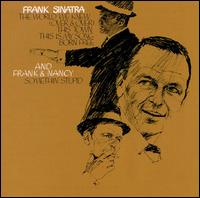Personnel
Track 1 (The World We Knew):
29/30-June-1967 (Thu/Fri)- New York. (from 9 P.M. to 12:30 A.M.).
Mel Davis, Ernie Royal, Clark Terry, Bernie Glow, Markie Markowitz (tpt); Buddy Morrow, Wayne Andre, Bob Alexander (tbn); Paul Faulise (b-tbn); Richard Berg, Ray Alonge, Brooks Tillotson (fr-h); Romeo Penque, George Berg, Ted Gompers, Vincent Abato, Harvey Estrin, Phil Bodner, Ray Beckenstein (sax/wwd); David Nadien, Gene Orloff, Sylvan Shulman, Mac Ceppos, Mannie Green, Tosha Samaroff, Raoul Poliakin, Leo Kruczek, Julius Schachter, Julius Brand, Joe Malin, Paul Winter, Max Hollander Charles Libove, Fred Buldrini, Aaron Rosand (vln); Sidney Brecher, Arnold Magnes, George Brown, Harold Coletta, Alfred Brown, Harold Furrnansky (via); Maurice Bialkin, Maurice Brown, Alan Shulman, Charles McCracken, Peter Makas Jr., Joseph Tekula (vlc); Margaret Ross (harp); Stan Freeman*, Moe Wechsler* (p); Eric Gale*, Al Caiola*, Bucky Pizzarelli*, Carl Lynch* (g); Toots Thielemans* (g/harrnonica); Milt Hinton* (b); Gary Chester* (d); George Devens*, Bobby Rosengarden, Phil Kraus* (perc). Gordon Jenkins, Billy Strange, Ernie Freeman (arr).
ADD: Dick Hyde, Lew McCreary (tbn); Don Randi (p); Donnie Lanier, Dennis Budimir, Bobby Gibbons, Louis Morell (g); Larry Knechtel, Chuck Berghofer, Carol Kaye (b/F-b); Hal Blaine (d); Milt Holland, Gary Coleman (perc). Recorded in Hollywood, under direction of Billy Strange.
Track 2 (Somethin' Stupid):
1-February-1967 (Wednesday) - Hollywood. Western Recorders
Oliver Mitchell, Roy Caton (tpt); Nathan Ross, Thelma Beach, Bernard Kundell, Israel Baker, William Kurasch, Arnold Belnick, Bonnie Douglas, Emo Neufeld, James Getzoff, Ralph Schaeffer (vln); Bill Miller, Donald Owens (p); Al Casey, Glen Campbell (g); Ralph Pena (b); Carol Kaye (el-b); Hal Blaine (d); Victor Feldman (perc); Billy Strange (cond).
Track 3, 4, 7 (This is My Love, Born Free, This is My Song):
24-July-1967 (Monday) - Hollywood. United Recording
James Decker, Arthur Frantz, Alan Robinson, Richard Mackey (fr-h); Arthur Gleghorn (fl); Arnold Koblentz, Bert Gassman (oboe); Lloyd Hildebrand (bsn); Wayne Songer, Blake Reynolds (clt); Ethmer Roten, Sheridon Stokes (fl/clt); Mischa Russell, Gerald Vinci, Joseph Livoti, Joseph Quadri, Lou Raderman, Victor Amo, Harry Bluestone, David Frisina, Nathan Kaproff, Carl LaMagna, Marshall Sosson, Nicholas Pisani, Paul Shure, Joe Stepansky, Alfred Lustgarten, Jack Gootkin, Ralph Schaeffer, Samuel Cytron, Walter Edelstein, Anatol Kaminsky, Murray Kellner (vln); Louis Kievman, Alvin Dinkin, Paul Robyn, Milton Thomas, Samuel Boghossian, Sanford Schonback (via); Ray Kramer, Justin DiTullio, Armand Kaproff (vlc); Ann Mason Stockton (harp); Bill Miller (p); Al Hendrickson (g); Keith Mitchell (b); Nick Fatool, Eddie Brackett Jr., Lou Singer (d/perc). Gordon Jenkins, Ernie Freeman (arr).
Track 5 (Don't Sleep in the Subway):
24-July-1967 (Monday) - Hollywood. United Recording.
Roy Caton, Dick Forrest, Virgil Evans, Anthony Terran, Oliver Mitchell (tpt); Morris Repass, Dick Hyde, Lew McCreary (tbn); Robert Knight (b- tbn); James Horn, Bill Green (sax/wwd); Sidney Sharp, Lennie Malarsky, William Kurasch, Ralph Schaeffer, Harry Bluestone, Victor Arno, Tibor Zelig, Arnold Belnick (vln); Harry Hyams, Alex Neiman (via): Joseph Saxon, Jesse Ehrlich (vlc); Bill Miller, Michael Melvoin (p); Donnie Lanier, Alvin Casey, Louis Morell, Glen Campbell (g); Chuck Berghofer (b); Carol Kaye (F-b); Hal Blaine (d); Frank Capp, Victor Feldman (perc); Ernie Freeman (cond); Betty Jane Baker, Peggy Clark, Gwenn Johnson, Sally Stevens, Jackie Ward, Gloria Wood (voe - recorded on 27-July-1967, at the same studio).
Track 6 (This Town):
Roy Caton, Dick Forrest, Virgil Evans, Anthony Terran, Oliver Mitchell (tpt); Morris Repass, Dick Hyde, Lew McCreary (tbn); Robert Knight (b- tbn); James Horn, Bill Green (sax/wwd); Sidney Sharp, Lennie Malarsky, William Kurasch, Ralph Schaeffer, Harry Bluestone, Victor Arno, Tibor Zelig, Arnold Belnick (vln); Harry Hyams, Alex Neiman (via): Joseph Saxon, Jesse Ehrlich (vlc); Bill Miller, Michael Melvoin (p); Donnie Lanier, Al Casey, Louis Morell, Glen Campbell (g); Chuck Berghofer (b); Carol Kaye (F-b); Hal Blaine (d); Frank Capp, Victor Feldman (perc);
ADD new track recorded on 27-July-1967, at the same studio, by: Michael Melvoin (p); Lawrence Knechtel (b); Eddie Brackett Jr. (d). And, of course, ADD the track recorded on 30-June by: Stan Freeman, Moe Wechsler (p); Eric Gale, Al Caiola, Bucky Pizzarelli, Carl Lynch (g); Toots Thielemans (g/harmonica); Milt Hinton (b); Gary Chester (d); George Devens, Phil Kraus (perc).
Track 8 (You Are There):
Mel Davis, Ernie Royal, Clark Terry, Bernie Glow, Markie Markowitz (tpt); Buddy Morrow, Wayne Andre, Bob Alexander (tbn); Paul Faulise (b-tbn); Richard Berg, Ray Alonge, Brooks Tillotson (fr-h); Romeo Penque, George Berg, Ted Gompers, Vincent Abato, Harvey Estrin, Phil Bodner, Ray Beckenstein (sax/wwd); David Nadien, Gene Orloff, Sylvan Shulman, Mac Ceppos, Mannie Green, Tosha Samaroff, Raoul Poliakin, Leo Kruczek, Julius Schachter, Julius Brand, Joe Malin, Paul Winter, Max Hollander Charles Libove, Fred Buldrini, Aaron Rosand (vln); Sidney Brecher, Arnold Magnes, George Brown, Harold Coletta, Alfred Brown, Harold Furrnansky (via); Maurice Bialkin, Maurice Brown, Alan Shulman, Charles McCracken, Peter Makas Jr., Joseph Tekula (vlc); Margaret Ross (harp); Stan Freeman*, Moe Wechsler* (p); Eric Gale*, Al Caiola*, Bucky Pizzarelli*, Carl Lynch* (g); Toots Thielemans* (g/harrnonica); Milt Hinton* (b); Gary Chester* (d); George Devens*, Bobby Rosengarden, Phil Kraus* (perc). Gordon Jenkins, Billy Strange, Ernie Freeman (arr).
Track 9 (Drinking Again):
1-February-1967 (Wednesday) - Hollywood.
Oliver Mitchell, Roy Caton (tpt); Dick Noel (tbn); Arthur Gleghorn (fl); Ronny Lang (clt); Bud Shank (fl); Nathan Ross, Thelma Beach, Bernard Kundell, Israel Baker, William Kurasch, Arnold Belnick, Bonnie Douglas, Emo Neufeld, James Getzoff, Ralph Schaeffer, Harry Bluestone, Anatol Kaminsky (vln); Nino Rosso, Ray Kramer, Armand Kaproff, Elizabeth Greenschpoon (vlc); Bill Miller, Donald Owens (p); Al Viola, Glen Campbell, Al Casey (g); Ralph Pefla (b); Carol Kaye (el-b); Irving Cottler, Hal Blaine, Eddie Brackett Jr., Victor Feldman (d/perc); Claus Ogerman (cond).
Track 10 (Some Enchanted Evening):
Roy Caton, Dick Forrest, Virgil Evans, Anthony Terran, Oliver Mitchell (tpt); Morris Repass, Dick Hyde, Lew McCreary (tbn); Robert Knight (b- tbn); James Horn, Bill Green (sax/wwd); Sidney Sharp, Lennie Malarsky, William Kurasch, Ralph Schaeffer, Harry Bluestone, Victor Arno, Tibor Zelig, Arnold Belnick (vln); Harry Hyams, Alex Neiman (via): Joseph Saxon, Jesse Ehrlich (vlc); Bill Miller, Michael Melvoin (p); Donnie Lanier, Al Casey, Louis Morell, Glen Campbell (g); Chuck Berghofer (b); Carol Kaye (F-b); Hal Blaine (d); Frank Capp, Victor Feldman (perc); H.B. Barnum (cond). [14]
